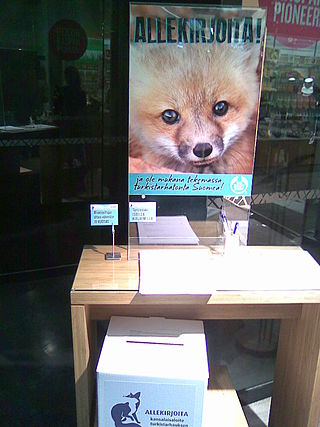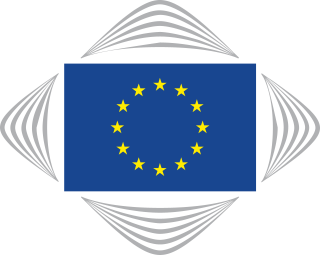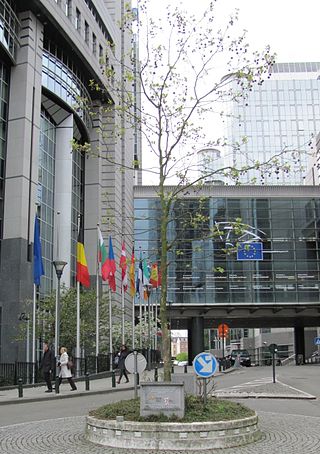
The Council of the European Union, often referred to in the treaties and other official documents simply as the Council, and informally known as the Council of Ministers, is the third of the seven Institutions of the European Union (EU) as listed in the Treaty on European Union. It is one of two legislative bodies and together with the European Parliament serves to amend and approve, or veto, the proposals of the European Commission, which holds the right of initiative.

The European Union (EU) is a supranational political and economic union of 27 member states that are located primarily in Europe. The Union has a total area of 4,233,255 km2 (1,634,469 sq mi) and an estimated total population of over 449 million. The EU has often been described as a sui generis political entity combining the characteristics of both a federation and a confederation.

The European Parliament (EP) is one of the two legislative bodies of the European Union and one of its seven institutions. Together with the Council of the European Union, it adopts European legislation, following a proposal by the European Commission. The Parliament is composed of 720 members (MEPs), after the June 2024 European elections, from a previous 705 MEPs. It represents the second-largest democratic electorate in the world, with an electorate of around 375 million eligible voters in 2024.

A popular initiative is a form of direct democracy by which a petition meeting certain hurdles can force a legal procedure on a proposition.

The European Committee of the Regions (CoR) is the European Union's (EU) assembly of local and regional representatives that provides sub-national authorities with a direct voice within the EU's institutional framework.

In Westminster and other parliamentary systems, a backbencher is a member of parliament (MP) or a legislator who occupies no governmental office and is not a frontbench spokesperson in the Opposition, being instead simply a member of the "rank and file".
Participatory democracy, participant democracy, participative democracy, or semi-direct democracy is a form of government in which citizens participate individually and directly in political decisions and policies that affect their lives, rather than through elected representatives. Elements of direct and representative democracy are combined in this model.
The Atlantic Council is an American think tank in the field of international affairs, favoring Atlanticism, founded in 1961. It manages sixteen regional centers and functional programs related to international security and global economic prosperity. It is headquartered in Washington, D.C. It is a member of the Atlantic Treaty Association.

Günter Verheugen is a German politician who served as European Commissioner for Enlargement from 1999 to 2004, and then as European Commissioner for Enterprise and Industry from 2004 to 2010. He was also one of five vice presidents of the 27-member Barroso Commission. After his retirement, he is now honorary Professor at the European University Viadrina in Frankfurt (Oder).

The political structure of the European Union (EU) is similar to a confederation, where many policy areas are federalised into common institutions capable of making law; the competences to control foreign policy, defence policy, or the majority of direct taxation policies are mostly reserved for the twenty-seven state governments. These areas are primarily under the control of the EU's member states although a certain amount of structured co-operation and coordination takes place in these areas. For the EU to take substantial actions in these areas, all Member States must give their consent. Union laws that override State laws are more numerous than in historical confederations; however, the EU is legally restricted from making law outside its remit or where it is no more appropriate to do so at a state or local level (subsidiarity) when acting outside its exclusive competences. The principle of subsidiarity does not apply to areas of exclusive competence.

The Shooters, Fishers and Farmers Party (SFF) is a conservative Australian political party. It primarily advocates for increased funding and services for rural and regional Australia, protecting the right to farm, enhancing commercial and recreational fishing, and relaxing gun control for citizens.

Anna Diamantopoulou is a Greek civil engineer and politician of the Panhellenic Socialist Movement (PASOK) who currently serves as president of the Athens-based think tank "DIKTIO" Network for Reform in Greece and Europe.
PRS Legislative Research, commonly referred to as PRS, is an Indian non-profit organisation that was established in September 2005 as an independent research institute to make the Indian legislative process better informed, more transparent and participatory. PRS is based in New Delhi.

The European Citizens' Initiative (ECI) is a European Union (EU) mechanism aimed at increasing direct democracy by enabling "EU citizens to participate directly in the development of EU policies", introduced with the Treaty of Lisbon in 2007. This popular initiative enables one million citizens of the European Union, with a minimum number of nationals from at least seven member states, to call directly on the European Commission to propose a legal act in an area where the member states have conferred powers onto the EU level. This right to request the commission to initiate a legislative proposal puts citizens on the same footing as the European Parliament and the European Council, who enjoy this right according to Articles 225 and 241 of the Treaty on the Functioning of the European Union (TEFU). The commission holds the right of initiative in the EU. The first registered ECI, Fraternité 2020, was initiated on 9 May 2012, although the first submitted ECI was One Single Tariff.

Reuven Michael Carlyle is a founder of Earth Finance, a global climate strategy and investment firm. He is also an American politician who served as a Democratic member of the Washington legislature representing the Washington's 36th legislative district in the state house between 2009 and 2016 and in the state senate between 2016 and 2023.

Amina Jane Mohammed is a Muslim Nigerian-British diplomat and politician who is serving as the 5th Deputy Secretary-General of the United Nations. Previously, she was Nigerian Minister of Environment from 2015 to 2016 and was a player in the Post-2015 Development Agenda process. She is also Chair of United Nations Sustainable Development Group.

Lobbying in the European Union, also referred to officially as European interest representation, is the activity of representatives of diverse interest groups or lobbies who attempt to influence the executive and legislative authorities of the European Union through public relations or public affairs work. The Treaty of Lisbon introduced a new dimension of lobbying at the European level that is different from most national lobbying. At the national level, lobbying is more a matter of personal and informal relations between the officials of national authorities, but lobbying at the European Union level is increasingly a part of the political decision-making process and thus part of the legislative process. 'European interest representation' is part of a new participatory democracy within the European Union. The first step towards specialised regulation of lobbying in the European Union was a Written Question tabled by Alman Metten, in 1989. In 1991, Marc Galle, Chairman of the Committee on the Rules of Procedure, the Verification of Credentials and Immunities, was appointed to submit proposals for a Code of conduct and a register of lobbyists. Today lobbying in the European Union is an integral and important part of decision-making in the EU. From year to year lobbying regulation in the EU is constantly improving and the number of lobbyists is increasing.

Kaja Kallas is an Estonian politician and diplomat. She was the first female prime minister of Estonia, a role she held from 2021 until 2024, when she resigned in advance of her appointment as High Representative of the European Union for Foreign Affairs and Security Policy. Since 2024, she has served as High Representative of the European Union for Foreign Affairs and Security Policy and Vice-President of the European Commission in the second von der Leyen Commission.

Darryl Lamont Barnes is an American politician who was previously a member of the Maryland House of Delegates from 2015 to 2023. Barnes has represented Maryland's 25th District since 2015. He also served as Deputy Majority Whip from 2017 to 2023, and was the Chair of Legislative Black Caucus of Maryland from 2018 to 2022.
The Conference on the Future of Europe was a proposal of the European Commission and the European Parliament, announced at the end of 2019, with the aim of looking at the medium- to long-term future of the EU and what reforms should be made to its policies and institutions. It is intended that the Conference should involve citizens, including a significant role for young people, civil society, and European institutions as equal partners and last for two years. It will be jointly organised by the European Parliament, the EU Council and the European Commission. On 19 April 2021, the multilingual digital platform of the Conference futureu.europa.eu was launched.













